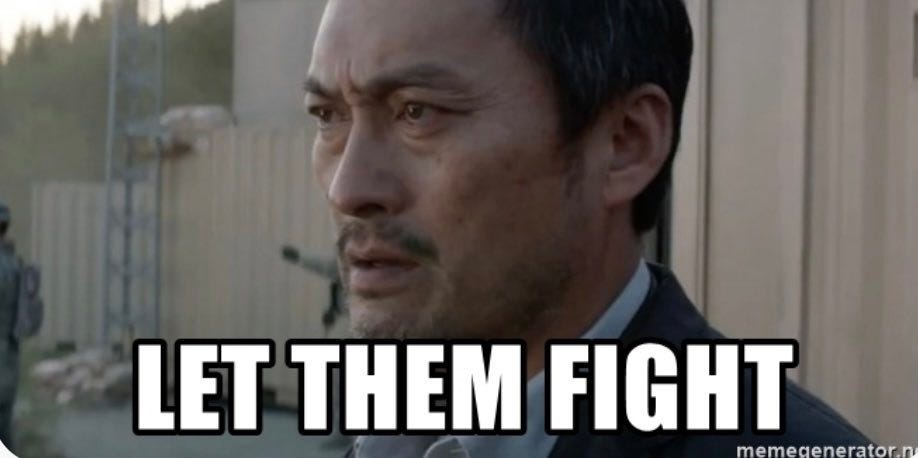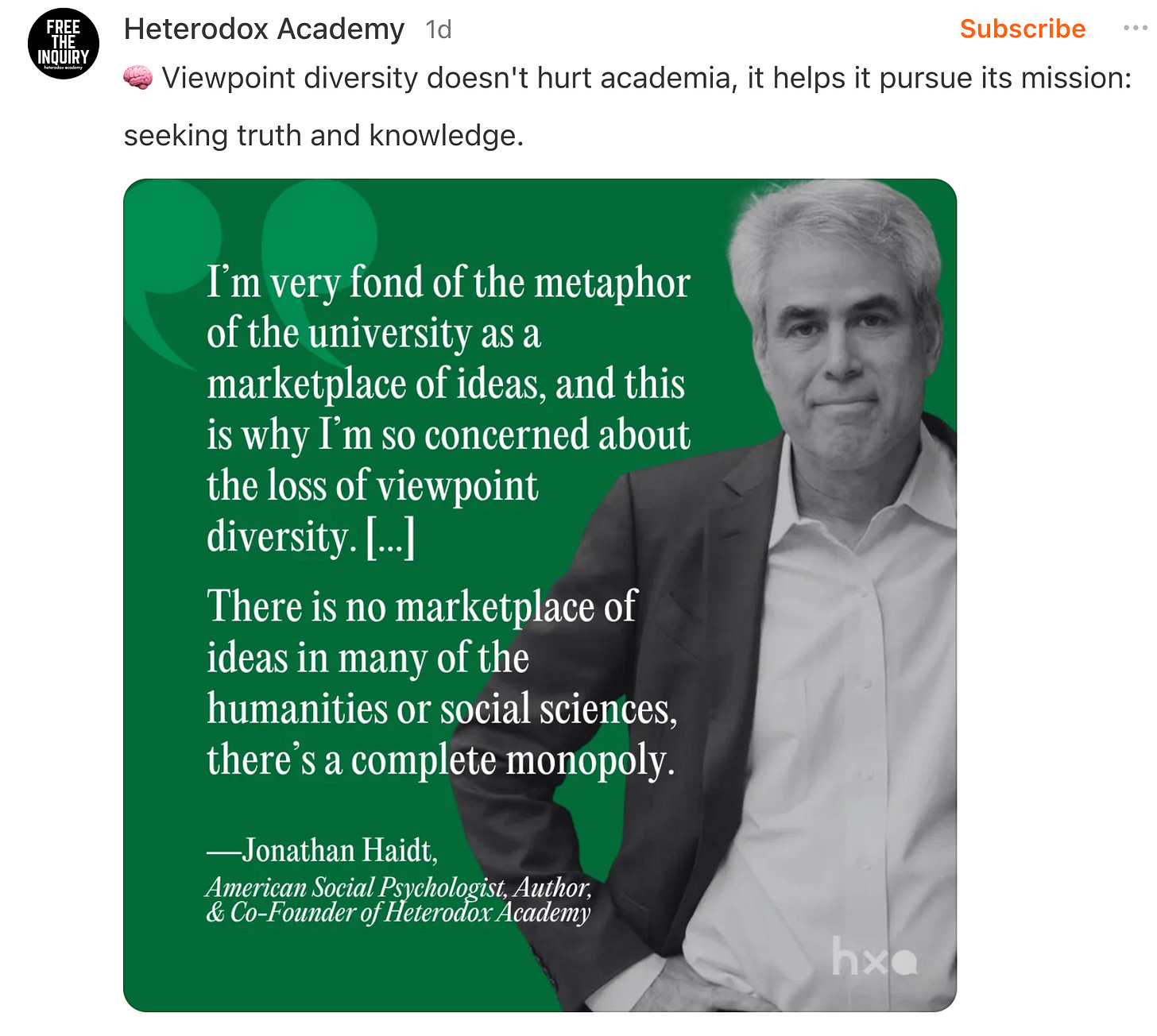Viewpoint diversity and its limits
Affirmative action for iconoclasts?
Just about everybody cares about, or pretends to care about, viewpoint diversity.1
Many on the left pretend to care because they see appeals to viewpoint diversity as a good way to get the sort of diversity they really want, which has to do with race and gender. Many on the right pretend to care because it’s a way to have their own favored views taken seriously, land themselves plum jobs, and get their right-wing kids accepted to good universities. The Trump administration pretends to care about viewpoint diversity (they do!—see their letter to Harvard) in part for the same reasons as others on the right, and in part because it’s a clever way to own the libs, using their own diversity rhetoric against them.
The test for whether people actually care about viewpoint diversity is whether they continue to value it when it doesn’t favor their side. I’ll believe that people on the left care when they push for gender studies programs to have more emphasis on evolutionary biology. I’ll believe that people on the right care when they stop trying to get professors punished for being critical of Israel. And I’ll never believe that the Trump administration cares about viewpoint diversity because I’m not an idiot.
Viewpoint diversity is a good thing
Pretending to care about viewpoint diversity is a useful rhetorical strategy because there is a general consensus that viewpoint diversity is a good thing. It’s obvious to many that progress in the sciences and the humanities benefits from an openness to new ideas and a willingness to challenge received wisdom.
As I was writing this, I came across a Substack post that summarizes what many think of viewpoint diversity (and the lack of it in academia), featuring a nice quote from Jonathan Haidt.
I’ve long been a supporter of viewpoint diversity. I attended the most recent conference of the Heterodox Academy, which has this on its website:
We advocate for policy and culture changes that ensure our universities are truth-seeking, knowledge-generating institutions grounded in open inquiry, viewpoint diversity, and constructive disagreement - because great minds don't always think alike.
And, following Haidt and others, I’ve argued that academia has suffered from not being diverse enough—see, for instance, my Progressives should worry more about their favorite scientific findings.
Ten years ago, I wrote a book called Against Empathy, and in the first chapter, I said this about the process of scientific inquiry.
We reason best when we have help, and certain communities help reason to flourish. Scientific inquiry is the finest example of how individuals who accept certain practices can work to surpass their individual limitations. Take my attack on empathy, for instance. I really do want to be fair, honest, and objective. But I’m only human, so it’s probably true that this book contains weak arguments, cherry-picked data, sneaky rhetorical moves, and unfair representations of those I disagree with. Fortunately, there are many who are in favor of empathy, and they’ll be highly motivated to poke holes in my arguments, point out counterevidence, and so on. Then I’ll respond, and they’ll respond back, and out of all this, progress will be made.
I’m not starry-eyed about science. Scientists are human, and so we are prone to corruption and groupthink and all sorts of forces that veer us away from the truth. But it does work stunningly well, and this is largely because science provides an excellent example of a community that establishes conditions where rational argument is able to flourish. I think the same holds, to varying extents, in other domains, such as philosophy, the humanities, and even certain sorts of political discourse. We are capable of reason and can exercise this capacity in the domain of morality.
When I wrote this, my purpose was to defend rationality as a means of arriving at the truth. However, it occurs to me now that it can also be seen as a case for the necessity of giving space to dissenting views—in this case, views about empathy that differ significantly from my own—and having social practices that allow these views to be expressed and debated. This is a prerequisite for the sort of rational deliberation that I’m praising.
We can see how acceptance of different viewpoints makes a difference. Looking at my own field, the areas of psychology where we’ve had the most success are those with the most vibrant debates between different perspectives. And some of our notable failures as a field—many of them revolving around the “replication crisis”—have occurred when discussion has been stifled, often because people were discouraged from challenging a politically popular orthodoxy.
As a different source of support for viewpoint diversity, a terrific article has just appeared in which the philosopher Elizabeth Barnes discusses how much she has benefited from arguing with Peter Singer about disability issues. She begins by pointing out the standard arguments in support of this sort of conflict.
More often than not, when we talk about open disagreement and free exchange of ideas, we tend to focus on their broader social value. We say things like: promoting open disagreement is crucial to protecting free speech; promoting open disagreement is the only way to prevent harmful silos and echo chambers; promoting open disagreement is vital to democracy, etc.
Then she adds:
But I think an under-discussed aspect of striving to have conversations across serious disagreement is the personal value they can bring. For entirely self-interested and self-regarding reasons, I think these kinds of conversations are good for me. I think they make me a better philosopher and a better thinker.
She has a lot to say about this—really, read the whole thing—but this discussion really stood out to me:
I’ve always tried to think that the single most valuable gift that someone can give me, qua philosopher, is a really great objection. If I’m doing philosophy well, I need to care more about what’s true than about being right. And this is stupidly hard, because the longer I play with an idea the more attached to it I become, and dammit I want to be right. But if I’m messing up, I (should) really want to know. And for that, I need the best objections.
But the truth is that people who are in broad philosophical agreement with me—while they can and do provide robust criticism—are just less likely to hit me with the toughest and hardest objections. That’s not from any lack of rigor on their part, it’s just that people who are broadly sympathetic to what I’m saying are less likely to be sympathetic to opposing viewpoints, and so less likely to defend them.
… Peter is an interlocutor who has given me a tremendous gift: he will always say what he thinks. No pandering, no soft-balling, just a good old-fashioned objection. I need this more than I’d realized.
But should we value viewpoint diversity when it comes to hiring professors?
Like I said, I find this all persuasive. But here I am, with some second thoughts. While I think it’s overwhelmingly positive for scholarly fields to include and welcome diverse viewpoints, I am more skeptical about the claim, often made, that we should favor viewpoint diversity when hiring new faculty members.
My arguments aren’t the usual ones. Many people are skeptical about viewpoint diversity more generally because they worry about the harm caused by the expression of certain views. I’ve heard academics say that those who express skepticism about affirmative action can cause psychological damage to minority students. Others argue that certain anti-Israel views shouldn’t be expressed in universities because they are offensive to Israeli students or Jewish students more generally. For both communities, these types of viewpoint diversity have more costs than benefits—the juice isn’t worth the squeeze. These concerns extend naturally to faculty hiring; they are arguments for not hiring the economist who argues against diversity programs or the historian who writes about how Israel is a genocidal state.
Whatever one thinks of this anti-diversity critique—and as you can see, they are endorsed by both the right and the left—this isn’t the argument I will be making.
As a final point, we’re not discussing free speech and academic freedom here. I recently wrote a post (Why are so few professors trouble-makers) arguing that scholars with diverse views—even those that many find repugnant—should have considerable latitude to express them. I haven’t changed my mind about this. My skepticism is rather about how much we should encourage such diverse views through faculty hiring.
OK, enough throat-clearing. I have three concerns regarding viewpoint diversity in faculty hiring.





